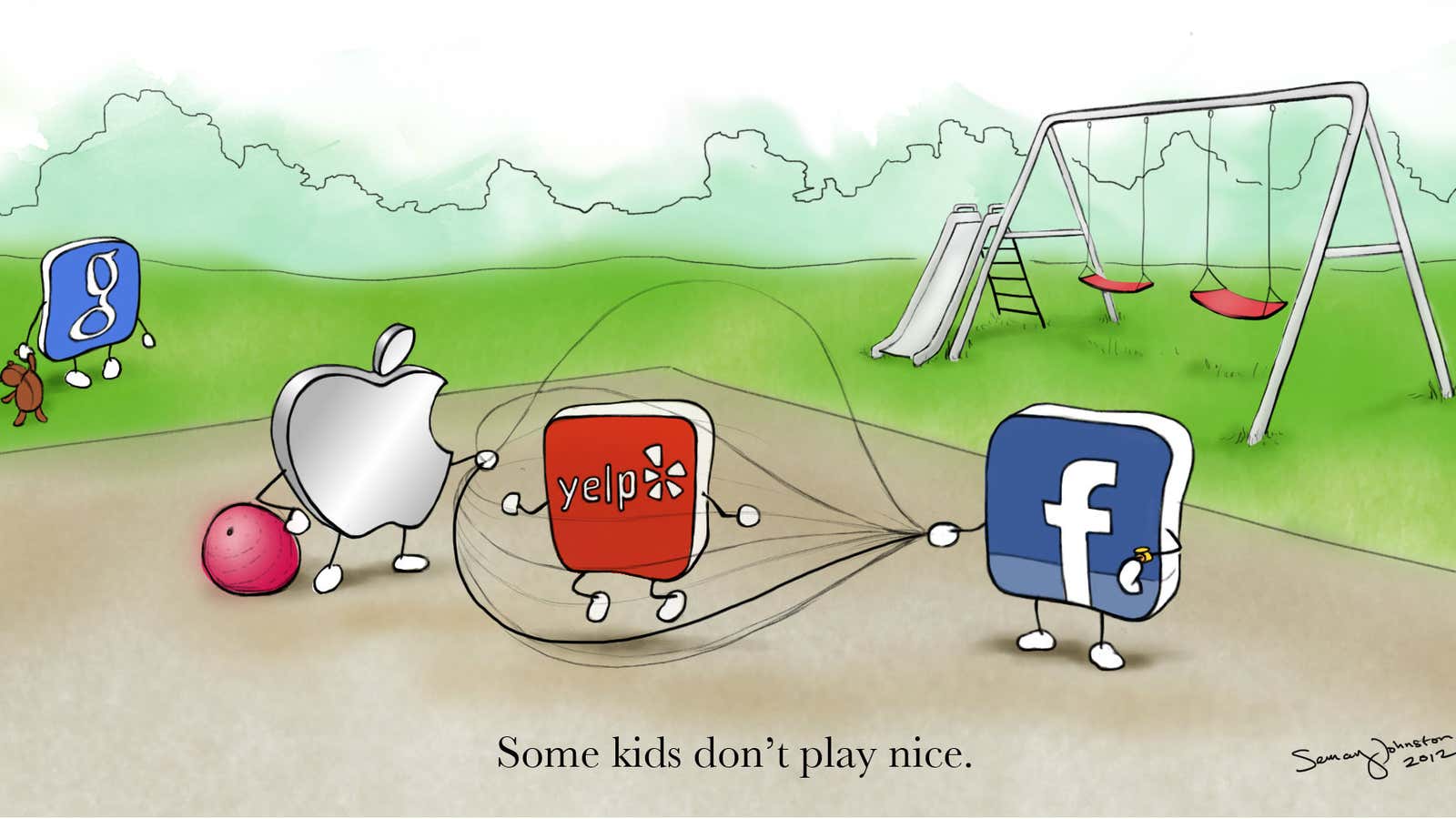Google, Apple, Facebook, and Yelp walk into a bar.
After a few drinks, they decide to offer the world something we’ve been wanting for a while, yet only they can create—the perfect restaurant search engine. Think about it: you tell your phone, “I want to eat a delicious pizza tonight at 7 pm;” Siri or Google Now crawl through Yelp to find the best pizza; Google compiles relevant local information; and Facebook shows you what pizza your friends have been raving about that you’ve got to try. It’s a great solution, i.e. everything you need, found in one place.
But sadly for our stomachs, this will never happen. Google, Apple, Facebook, and Yelp will never walk into a bar together, or leave a bar together, or do anything together, and this is why:
Slowly but surely, these companies are turning into search engine competitors. Google is constantly grappling against Apple in mobile search, Facebook in social search, and Yelp in local search. Thus, we see the following:
- Apple notoriously shoves Google Maps out of the iPhone’s iOS 6, even though Google Maps is a far better mapping application than Apple Maps, perfected with over a decade of Googler output.
- Google’s Android platform doesn’t have a deep integration with Facebook, even though Facebook has far more social relevancy than Google Circles.
- Yelp and Google—well, how many times has Yelp sued Google now? Needless to say, they don’t play nice together.
Though the balkanization of search is impeding restaurant discovery, Apple offers a glimpse of hope. Earlier this year, Apple integrated Yelp into Siri voice commands for restaurant searches, and recently, Apple made Yelp a core part of iOS 6 maps, including its star ratings and check-in functions. Apple’s iOS 6 also includes deep integration with Facebook and taps into some social graph goodies.
But even Apple chose a less powerful feature for its iOS 6 due to competitive threats with Facebook. In a perfect world, Apple would have chosen the Facebook check-in.
Embedding Facebook check-ins into Apple Maps, as opposed to Yelp check-ins, is the obvious choice since Facebook creates a far more relevant social experience for consumers due to its ubiquitous existence and influence. And on a separate note, why aren’t Facebook likes integrated into Apple Maps? Yelp reviews coupled with Facebook likes, seen in one tap of an Apple map pin, creates a winning restaurant search experience—but it’s just not there. Apple can’t be too dependent on Facebook. Apple can’t, and won’t, rely on the social graph for everything.
Google and Facebook have emerged as the world’s two leading search engines, producing over a billion searches every day, and will always be independent of each other—their search engines are too at odds to partner. Likewise, Apple has a long-term goal of controlling the entire Apple ecosystem and will increasingly become more independent. In contrast, Yelp is becoming increasingly reliant upon Google and Apple. If ever displaced by a rising local review competitor down the road, Yelp could lose native integration into either platform. (New incumbents such as Ness, Alfred, and Hoppit are trying to look across review sites and social networks to make personal recommendations—but as personal search engines, all are direct competitors to Google, Apple, Facebook, and Yelp. In fact, Google gobbled up Alfred earlier this year.)
The ideal restaurant search requires robust context-aware searches, with relevant location, review, and social information, but the lack of collaboration between the web’s most important players presents a major challenge to achieving it. Perhaps a nimble agnostic startup will come along and disrupt restaurant search altogether, but until then, the consumer simply won’t eat as well.
